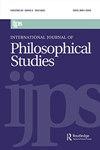Understanding Deep Disagreement
IF 0.6
3区 哲学
0 PHILOSOPHY
INTERNATIONAL JOURNAL OF PHILOSOPHICAL STUDIES
Pub Date : 2023-05-27
DOI:10.1080/09672559.2023.2263709
引用次数: 0
Abstract
ABSTRACTThe axiological account of deep disagreements is described and defended. This proposal understands this notion in terms of the existential importance of the topic of disagreement. It is argued that this account provides a straightforward explanation for the main features of deep disagreements. This proposal is then compared to the contemporary popular view that deep disagreements are essentially hinge disagreements – i.e. disagreements concerning clashes of one’s hinge commitments, in the sense described by the later Wittgenstein. It is claimed that hinge disagreements are only plausibly deep disagreements insofar as there can be a specific class of hinge commitments that are axiological in nature, thereby lending further support to the axiological account of deep disagreement.KEYWORDS: Deep disagreementepistemologyepistemology of disagreementhinge epistemologyWittgenstein Disclosure StatementNo potential conflict of interest was reported by the author(s).Notes1. For discussion of this general idea, see Fogelin (Citation1985), Brenner and Godden (Citation2010), Pritchard (Citation2018c), Lavorerio (Citation2020), Ranalli (Citation2020), and Siegel (Citation2021). See also the related discussion of epistemic relativism in the context of hinge epistemology, such as Williams (Citation2007), Coliva (Citation2010), Pritchard (Citation2010, Citation2018c), Kusch (Citation2016), and Carter (Citation2017). For two recent critical discussions of the relationship between hinge disagreements and deep disagreements, see Ranalli (Citation2021) and Pritchard (Citationforthcoming-a).2. There is, of course, a wealth of philosophical material on the question of what, if anything, could appropriately perform the role of being of fundamental value in the sense that we are interested in. For a recent work that usefully engages with questions of this general kind, see Tiberius (Citation2018).3. See Pritchard (Citation2018a).4. The case is due to Christensen (Citation2007, 193) and is widely discussed in the epistemology of peer disagreement literature.5. For some prominent defences of (versions of) conciliationism, see Christensen (Citation2007), Elga (Citation2007), Feldman (Citation2007), and Cohen (Citation2013).6. I explore this point about reflection and non-conciliationism, along with some of its implications for the epistemology of disagreement, in Pritchard (Citation2018b, Citation2019). See also Pritchard (Citation2020, Citation2022c).7. Interestingly, this high level of conviction can go hand-in-hand with periods of anxiety about whether such conviction is warranted. I discuss this phenomenon as it manifests itself in the religious case in Pritchard (Citationforthcoming-b, Citationforthcoming-c).8. I offer my own reading of On Certainty in a number of places, but see especially Pritchard (Citation2015, part 2). For some of the main texts in this regard, see Strawson (Citation1985), McGinn (Citation1989), Williams (Citation1991), Moyal-Sharrock (Citation2004), Wright (Citation2004), Coliva (Citation2015), and Schönbaumsfeld (Citation2016). For a recent survey of this literature, see Pritchard (Citation2017b).9. The mention of differing epistemic frameworks naturally raises the specter of epistemic relativism. Although it would take us too far afield to get into this issue here, my own view is that the possibility of divergence in hinge commitments needn’t lead to epistemic relativism, at least of a problematic kind that entails incommensurable epistemic systems. See Pritchard (Citation2010, Citation2018c). For discussion of the related idea that deep disagreements turn on the employment of distinct fundamental epistemic principles, see Lynch (Citation2010) and Kappel (Citation2012).10. This way of thinking about hinge commitments is most associated with the entitlement account offered by Wright (e.g. Citation2004) and the related extended rationality account offered by Coliva (e.g. Citation2015).11. See, for example, Williams (Citation2004) and Pritchard (Citation2015, part 2).12. Indeed, one of the main themes in Wittgenstein’s discussion of hinge commitments is that one’s actions manifest this overarching certainty that underlies our system of rational evaluation. As he puts it, echoing Goethe: ‘In the beginning was the deed.’ (OC, §396).13. Elsewhere, I have described this overarching certainty as the über hinge commitment. See, for example, Pritchard (Citation2015, part 2).14. Here is Wittgenstein.‘It strikes me that a religious belief could only be something like a passionate commitment to a system of reference. Hence, although it’s belief, it’s really a way of living, or a way of assessing life. It’s passionately seizing hold of this interpretation’ (Wittgenstein Citation1977, §64e).This remark by Wittgenstein has prompted a lot of critical discussion, but for a particularly helpful contemporary treatment of it, see Schönbaumsfeld (Citation2014).15. I have explored the application of the Wittgensteinian notion of a hinge commitment to the religious domain – what I term quasi-fideism – in a number of places. See, especially, Pritchard (Citation2011, Citation2017a, Citation2022a). For specific discussion of clashes of worldview in the context of quasi-fideism, see Pritchard (Citation2022b).16. Thanks to Maria Baghramian and Rowland Stout. This paper was written while a Senior Research Associate of the African Centre for Epistemology and Philosophy of Science at the University of Johannesburg.理解深刻分歧
摘要对深层分歧的价值论解释进行了描述和辩护。本提案从分歧话题的存在重要性的角度来理解这一概念。有人认为,这种说法为深刻分歧的主要特征提供了一个直截了当的解释。然后将这一建议与当代流行的观点进行比较,即深刻的分歧本质上是铰链分歧-即,在后来的维特根斯坦所描述的意义上,关于一个人的铰链承诺冲突的分歧。有人声称,只要存在一种特定类别的铰链行为本质上是价值论的,铰链分歧就只能是似是而非的深度分歧,从而进一步支持深度分歧的价值论解释。关键词:深度歧见;歧见论;歧见论;关于这一总体思路的讨论,请参见Fogelin (Citation1985)、Brenner和Godden (Citation2010)、Pritchard (Citation2018c)、Lavorerio (Citation2020)、Ranalli (Citation2020)和Siegel (Citation2021)。参见在hinge认识论背景下对认识论相对主义的相关讨论,如Williams (Citation2007)、Coliva (Citation2010)、Pritchard (Citation2010、Citation2018c)、Kusch (Citation2016)和Carter (Citation2017)。关于最近关于关键分歧和深度分歧之间关系的两个关键讨论,请参见Ranalli (Citation2021)和Pritchard (citation即将到来-a)。当然,有大量的哲学材料是关于什么,如果有的话,可以适当地扮演我们感兴趣的意义上的基本价值的角色。最近有一部关于这类问题的著作,见《提比略》(Citation2018)。参见Pritchard (Citation2018a)。这个案例是由Christensen提出的(Citation2007, 193),并在同行分歧文献的认识论中被广泛讨论。关于和解主义(不同版本)的一些突出辩护,请参见克里斯滕森(Citation2007)、埃尔加(Citation2007)、费尔德曼(Citation2007)和科恩(Citation2013)。我在Pritchard (Citation2018b, Citation2019)中探讨了关于反思和不调和主义的这一点,以及它对分歧认识论的一些含义。参见Pritchard (Citation2020, Citation2022c)。有趣的是,这种高水平的信念可能与对这种信念是否有根据的焦虑时期密切相关。我讨论这一现象,因为它在普里查德的宗教案例中表现出来(引文即将到来-b,引文即将到来-c)。我在许多地方提供了我自己对《论确定性》的阅读,但请特别参阅普里查德(Citation2015,第2部分)。关于这方面的一些主要文本,请参阅斯特劳森(Citation1985)、麦克金(Citation1989)、威廉姆斯(Citation1991)、莫亚尔-沙罗克(Citation2004)、赖特(Citation2004)、科利瓦(Citation2015)和Schönbaumsfeld (Citation2016)。有关该文献的最新调查,请参阅Pritchard (Citation2017b)。提到不同的认知框架自然会引起认知相对主义的幽灵。虽然在这里讨论这个问题会让我们走得太远,但我自己的观点是,在关键行为中分歧的可能性不一定会导致认知相对主义,至少不会导致那种需要不可通约的认知系统的有问题的相对主义。参见Pritchard (Citation2010, Citation2018c)。关于深层分歧取决于不同基本认知原则的运用这一相关观点的讨论,见Lynch (Citation2010)和Kappel (Citation2012)。这种对铰链承诺的思考方式与Wright提出的权利解释(例如Citation2004)和Coliva提出的相关扩展理性解释(例如Citation2015)最为相关。例如,参见Williams (Citation2004)和Pritchard (Citation2015, part 2)。事实上,维特根斯坦关于关键行为的讨论的主题之一是,一个人的行为表现出这种压倒一切的确定性,这是我们理性评估体系的基础。正如他引用歌德的话所说:“一开始就有行动。”(oc,第396段)。在其他地方,我把这种压倒一切的确定性描述为“她的关键承诺”。例如,参见Pritchard (Citation2015, part 2)。这是维特根斯坦。我突然意识到,宗教信仰只能是一种对参照系的热情承诺。因此,虽然它是信仰,但它实际上是一种生活方式,或一种评估生活的方式。它充满激情地抓住了这种解释”(Wittgenstein Citation1977,§64e)。维特根斯坦的这句话引发了许多批评性的讨论,但对于它的一个特别有用的当代处理,请参见Schönbaumsfeld (Citation2014)。
本文章由计算机程序翻译,如有差异,请以英文原文为准。
求助全文
约1分钟内获得全文
求助全文
来源期刊

INTERNATIONAL JOURNAL OF PHILOSOPHICAL STUDIES
PHILOSOPHY-
CiteScore
0.90
自引率
0.00%
发文量
29
期刊介绍:
The International Journal of Philosophical Studies (IJPS) publishes academic articles of the highest quality from both analytic and continental traditions and provides a forum for publishing on a broader range of issues than is currently available in philosophical journals. IJPS also publishes annual special issues devoted to key thematic areas or to critical engagements with contemporary philosophers of note. Through its Discussion section, it provides a lively forum for exchange of ideas and encourages dialogue and mutual comprehension across all philosophical traditions. The journal also contains an extensive book review section, including occasional book symposia. It also provides Critical Notices which review major books or themes in depth.
 求助内容:
求助内容: 应助结果提醒方式:
应助结果提醒方式:


